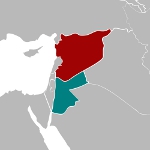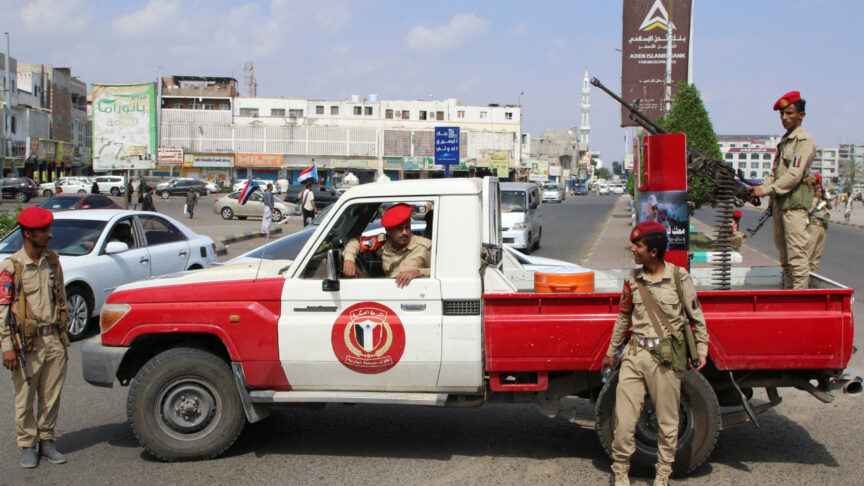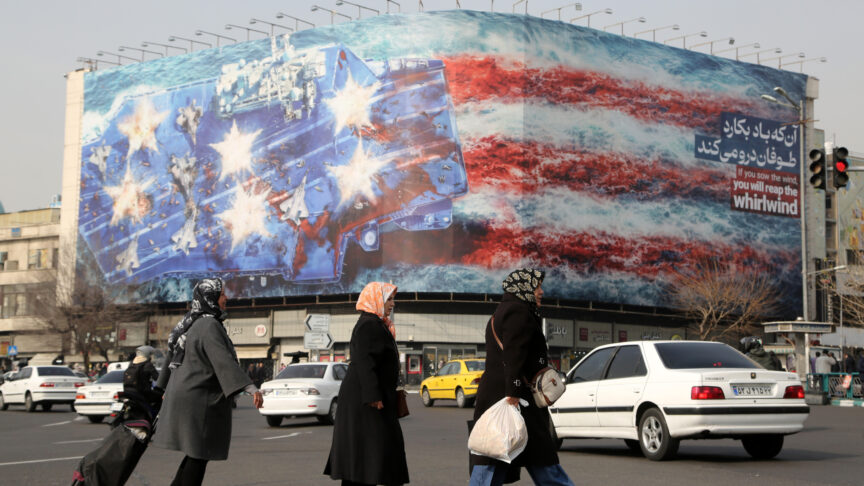Syria: the view from Jordan
Amman has gradually escalated its anti-Assad posture, providing wider political and military support in a bid to try and prevent the emergence of a chaotic no man’s land on its border, it continues to seek a political deal to end the conflict.
This essay forms part of an eight-part ECFR series exploring the regional responses, dynamics and ramifications of the Syrian uprising and civil war. These essays have been drawn together in the ECFR report – The regional struggle of Syria.
– – –
 Of all Syria’s neighbours, Jordan has trod most cautiously since the outbreak of the conflict in March 2011. Deeply concerned by the threat of spill-over instability and violence, Jordan has naturally been more preoccupied with ensuring its own resilience than the survival or demise of Bashar al-Assad. Given the potentially destabilising impact of a prolonged civil war, Amman has continually sought a political deal to end the conflict, even as it has gradually escalated its anti-Assad posture. Despite the sharp challenges posed by Syria, the crisis has also proved of some use to the Royal Palace, serving to cement domestic and international backing just as it was beginning to look slightly vulnerable.
Of all Syria’s neighbours, Jordan has trod most cautiously since the outbreak of the conflict in March 2011. Deeply concerned by the threat of spill-over instability and violence, Jordan has naturally been more preoccupied with ensuring its own resilience than the survival or demise of Bashar al-Assad. Given the potentially destabilising impact of a prolonged civil war, Amman has continually sought a political deal to end the conflict, even as it has gradually escalated its anti-Assad posture. Despite the sharp challenges posed by Syria, the crisis has also proved of some use to the Royal Palace, serving to cement domestic and international backing just as it was beginning to look slightly vulnerable.
Jordan’s response to developments in Syria has primarily been driven by fears about the potential security and political implications of the crisis for the Hashemite Kingdom. In addition to the potentially destabilising impact of at least half a million refugees (a number that could rise significantly, particularly if Damascus witnesses deeper fighting), Jordan’s caution reflects fears that overt manoeuvring against Assad could provoke a hostile response. While Assad’s days may ultimately be numbered, Amman remains wary of his still-considerable power and his ability to fuel problems for his southern neighbour, whether by directly attacking the country or by covertly provoking unrest. It is also knows that if Assad remains in power Jordan will have nowhere to run. As such Amman feels significantly more vulnerable that other regional actors, and accordingly continues to maintain diplomatic ties with Damascus.
At the same time, the intensifying jihadi dimension to the Syria conflict poses a direct security threat to Amman. With Jordanian jihadists inspired by an al-Qaida ideology travelling to fight in Syria, there is deepening fear in Amman that they will eventually turn their focus to Jordan (though there are also quiet hopes in Amman that many of them will die in Syria). Given the close proximity of northern cities to the battlefield in southern Syria, the threat is seen as far more immediate than during the Iraq war, when Jordan had a buffer zone of hundreds of miles of empty desert (but still faced significant attacks, including the 2005 Amman hotel bombings which killed 60 people). Jordanian officials are particularly perturbed by the risk of state collapse in Syria, and the country’s potential transformation into an ungovernable space. This could be utilised by non-state actors, and act as a breeding ground for jihadi militants to mobilise and plot against the Hashemite regime, with the threat of chemical weapon proliferation.
Given deepening levels of conflict in Syria, including close to the Israeli-controlled Golan Heights (which also borders Jordan), and widening violence in Iraq, Amman now sits amidst an increasingly dangerous regional environment. To guard against violence spilling over into the country, the Jordanian army is being mobilised in greater strength along its borders, with an increase in Western military expertise and assistance.. Some small local popular militias have also been formed in border towns to defend against any Syrian army incursions.
The Kingdom’s concerns run deeper, however, reflecting the growing political and economic tensions that have enveloped Jordan since the outbreak of the Arab Uprisings in early 2011, and a fear that the Syria crisis could provoke an intensification of these forces. Feeding off pressing economic challenges and an increasingly ineffectual political system, the Kingdom has over the past two years witnessed unprecedented – though still moderate by regional standards – pro-reform discontent. This has come from traditional opposition forces represented by the Muslim Brotherhood, as well as historically loyalist East Bank tribes.
In this context the conflict could end up solidifying a regional order intrinsically hostile to Hashemite rule, exacerbating domestic tensions and challenges facing the King. Of central concern for the Royal Palace is the potential for the conflict to empower Sunni Islamist forces. If Syria was to fall under the sway of the Muslim Brotherhood, dominant among the external political opposition, or worse, the more radical forces now dominant among rebel fighters, they could empower similar forces in Jordan, whether in the guise of the country’s Muslim Brotherhood or more radical groups. Not only would this pose an intensified threat to royal authority, but it might provoke an aggressive counter-response by East Bank security forces intent on maintaining control over the state. Even if they do not travel to fight in Syria, there are concerns that Salafi-minded Jordanians in conservative areas of the country, such as Zarqa and Irbid, could be ideologically hardened by developments in Syria, potentially provoking deeper challenges to the state and Hashemite system.
With the Jordanian Brotherhood maintaining wide support among the country’s urban-based and largely Palestinian population, Amman has been refusing access to Syrian Palestinians refugees, and has tried to keep other Syrian refugees in camps in the north of the country to avoid a demographic shift that could further strengthen the Brotherhood’s hand. While Jordan does not suffer from sectarian tensions, the East-Bank-Palestinian/urban divide has long polarised the country and the refugee crisis could intensify this fracture line if Syrians do not quickly return home.
The refugee crisis is also likely to strain the country’s precarious finances and national infrastructure. While Jordan has significant experience of refugee flows – including Palestinians and Iraqis – the Syria refugee influx comes at a perilous economic moment which is already driving domestic discontent. Amman has to date been forced to shoulder much of the financial burden single-handedly, given significant shortfalls in international funding appeals. The Royal Palace knows that increased demands on state finances and infrastructure, including already stretched electricity and water supplies, will directly feed wider popular unrest. Although the refugees are being kept in camps away from Jordanian population centres, popular resentment towards the refugees is growing as they are increasingly blamed for economic woes.
Needless to say, this is more than a one way street, and fears associated with the Syrian crisis have also been used to strengthen the appeal of the status quo and the monarchy’s position. Indeed, the timing has, partly, been fortuitous for the King given his domestic challenges. As violence and extremism have increased in Syria, the number of protests in Jordan has declined as fears about the threat of violence and instability spilling over have grown. The perception that Brotherhood parties in both Egypt and Syria have displayed political ineptitude has also raised popular anxiety about what the Brotherhood would do in Jordan if they were to come to power. These fears have understandably gained popular traction given deepening regional turmoil, helping quell demands for deeper reform.
Meanwhile, the Syria crisis has also served to sow divisions among opposition groups that had begun to find some common positions. While Jordan’s Islamist political forces have lined up in strong support of the rebels, some leftist figures have expressed ongoing support for Assad. These divisions have become increasingly contentious, diluting efforts at forming a united front.
Nonetheless, Jordan’s chosen policy towards Syria has been (and remains) one of caution, wishing to neither provoke Assad into retaliation, and fearful of spill over violence and the potential for regime collapse that could empower hostile forces. This explains the longstanding desire to remain publicly at arms’ length from the conflict, and even the maintenance of diplomatic ties with Syria, despite strong pressure from close allies in the Gulf to more decisively join the anti-Assad cause. While the Kingdom has gradually assumed a more forward-leaning position in support of opposition elements since mid-2012, this does not reflect shifting strategic ambitions, but rather a pursuit of wider protective measures given the growing dangers. As radical forces have gained ground in Syria, Amman has slowly assumed a more pro-active stance to try and support more moderate forces and avoid the creation of jihadi-controlled zones along its border. Given the growing likelihood of some form of failed state in Syria, Amman wants to ensure that it has established ties with those rebels lining the Jordanian border in Daraa province. Amman has also indicated support for a rebel-controlled safe zone in the south of the country, as a means of preventing ongoing refugee outflows, and perhaps even of enabling some Syrians now in Jordan to return to Syria.
Accordingly, Amman embraced the former Syrian prime minister, Riad Hijab, following his defection in August 2012, as their preferred candidate to lead a transition, given his non-Islamist leanings and a belief that he would be best placed to ensure Syria’s institutional continuity and territorial integrity. More importantly – although it continues to deny it publicly – Amman agreed in late 2012 to open its borders to Saudi weapons transfers to some moderate opposition forces in southern Syria, and is reported to have assisted in flying in weapons from Croatia. Amman also signed off on US training camps for the rebels on its territory. In May the core Friends of Syria Group – the London 11 – met in Jordan.
As part of this shift, Jordan has increasingly looked to the protective umbrella provided by its regional and international allies. Given Jordan’s close ties to the Gulf monarchies, it may have been expected to fall into line more quickly with their strategic ambitions, but Amman long resisted pressure to take an assertive stand (to the detriment of financial inflows and its diplomatic relations with Qatar in particular). Now that Amman is slowly upping its role, however, it has sought out wider protective backing. Significantly it has looked to Riyadh and Washington, not just because of long-standing and deep relations with these two states but also because both are seeking to ensure a softer transition (as favoured by Amman), in contrast to Qatar and Turkey, which have pushed for deeper change and support more radical opposition forces. Relations between Qatar and Jordan remain strained. Amman's recent decision to move forward with facilitating increased material aid to the armed rebels is likely to have come with important assurances from Riyadh and Washington DC that they are fully committed to providing substantial financial and military assistance to ensure that violent unrest does not spread into Jordan. The US decision in early June to leave Patriot missiles stationed in the Kingdom after planned training exercises, in addition to a small deployment of US troops, was a very important sign of this commitment, demonstrating that preventing the spill over of violence into Jordan is now central to US thinking.
However, even as Amman gingerly inches forward with greater support for the armed opposition, it continues to tread very carefully and to press for some form of political transition (including backing Geneva II) that would avoid militarised, root and branch – and in Amman’s eyes immensely threatening – change. As recently as May, the foreign minister of Iran, Assad’s key regional backer, travelled to Amman, and the two countries proclaimed an ongoing desire for negotiations between the regime and opposition. Amman still hopes to foster some form of “inclusive” political settlement, led by secular-leaning figures, to preserve the country’s crumbling institutions and national integrity.
Even so, Jordan’s fear of a disintegrating Syria providing succour to militant jihadists on its border is now looking increasingly likely. Given the probability of an unstable, fractured, violent Syria for some years to come, Jordan is bracing itself for stormy winds. But Jordan continues to hold an important strategic card: the confident knowledge that it will not be abandoned by the West, which sees the Kingdom as a critical source of regional stability and a key ally of Israel. The Gulf states are also intent on propping up the Hashemite system, to ensure that unrest does not seep from the republics into the monarchies. Whatever happens in Syria, Jordan is likely to be increasingly dependent on these allies.
Julien Barnes-Dacey is a policy fellow with the European Council on Foreign Relations. Follow him on twitter @jbdacey
The European Council on Foreign Relations does not take collective positions. ECFR publications only represent the views of their individual authors.


